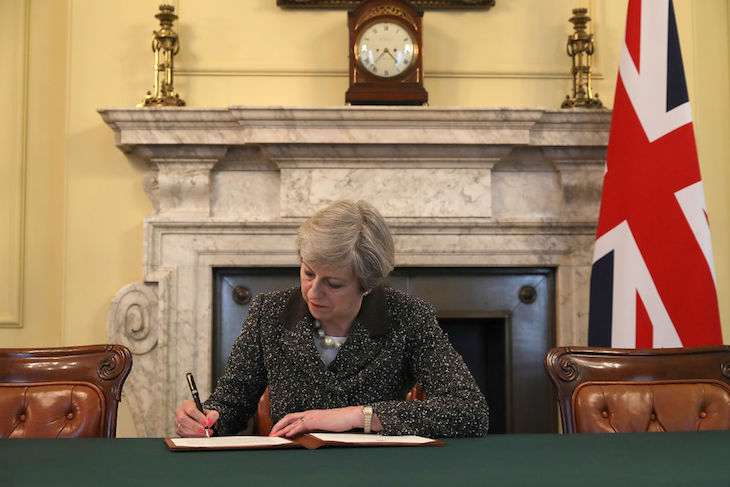There will be howls of outrage in some quarters if it is confirmed that the government has offered the EU a ‘divorce’ bill of up to £50 billion (over several years). Some on the leave side of the debate insist that the bill should be zero. They ask: does the EU not owe us some money for our share of all the bridges we have helped build in Spain and railway lines in Poland? But it was never realistic to think we could leave the EU and maintain good relations with the bloc without paying a penny — even if a House of Lords report did seem to suggest that this would be legally possible. We are in the process of creating a new relationship with the EU, not ending it altogether.
Having agreed an EU budget which stretched until 2020, it was right to fund these programmes until the end of that period — which, after all, is only a year after our departure. Thereafter there will be ongoing pension obligations, but a fraction of what we would otherwise be on the hook for.
The government’s offer is a mark of serious intent, proof that we want constructive and co-operative relations as we start to discuss the terms of a free-trade deal. The money, payable over many years, is still a saving when compared to the ever-rising sums which we would be required to pay had we decided to remain in the bloc.
Brexit was never just about cash: indeed, most people who voted to leave were prepared for a costly, painful process. They also thought it would be worthwhile. By the time we leave we will have regained our freedom to make our own trade deals with outside countries. Provided that we use this freedom, and build new export industries without compromising our existing EU trade, we should be able to grow the economy in such a way as to make the leaving bill seem like good value.
There are still hurdles to overcome. As has been made clear on both sides, nothing is agreed until everything is agreed. The EU has yet to accept the government’s offer, and assuming trade talks do start in -January, we can still expect months of bluster. The EU is likely to want to try to exclude financial services from a trade deal and we must ensure that they are included. But at least talks should now be able to start in a constructive manner. Now we have put money on the table, the EU’s negotiating team knows what it would lose if it were to collapse the talks through sheer obstinacy. From now on, every member state knows that a failure to keep Britain at the negotiating table will mean cancelled projects — and higher contributions from their own coffers.
There is also the issue of the Irish border to resolve. As David Trimble explains on page 16, this has flared up thanks as much to the internal politics of the Irish Republic as to the practical workings of the EU. It should not be impossible to come up with an arrangement which keeps traffic flowing freely across the border while police and customs officials continue to work — as they already do — to enforce the different fiscal and regulatory regimes which exist in Ireland and the UK.
So long as the government is able to give a firm rebuttal to the inevitable charges of a sell-out, it should now emerge from a troubled few weeks in better shape. Some believed that Philip Hammond’s Budget would provide the coup de grâce to this struggling government. Yet there has been no unravelling. The Chancellor lacked inspiration, but offered critics little to seize on.
Theresa May could yet end the year having successfully delivered a Budget and cleared the biggest hurdle on the Brexit talks, confounding those who thought the negotiations would end in stalemate. If so, she’ll find herself in the best position she’s been in since before the general election.
This week, we have seen the fuss over the publication of the Brexit impact assessments, of which edited versions have been handed to the select committee on exiting the EU. But how much use are these assessments anyway? We know how laughably bad economic forecasts have proved to be in the past, none more so than the gruesome assessment published by George Osborne a month before the 2016 referendum. Instead of 500,000 fewer jobs, as that report envisaged, we now have 350,000 more jobs.
Brexit always was going to be a step into the unknown, and no one can predict the consequences with any accuracy. More-over, Brexit itself will not make the country -richer or stronger — it is merely the removal of a constraint. What happens after Brexit will depend on the quality of decision-making in 10 Downing Street. When it no longer has to process EU diktats (which take almost a third of its time, by some of estimates) there will be room for more decisions. They’d -better be the right ones.
For months, the future has seemed to be a matter of either/or — either we trade freely with the EU or we make our own way building new alliances elsewhere in the world. If the result of the government’s offer is that trade talks can begin and we can now -contemplate both of these things, it will be a price worth paying.






Comments